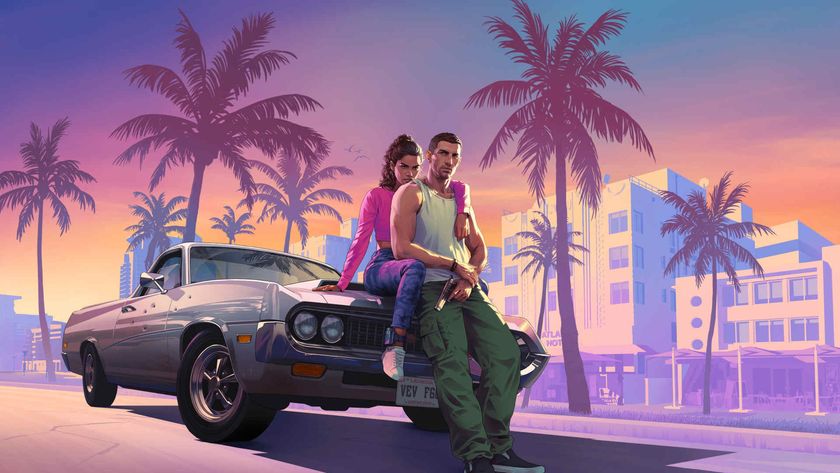Assassin's Creed Unity may not be the best in the series, but it's the most Assassin's Creed there is
Yes, the one with the googly-eyed bug people
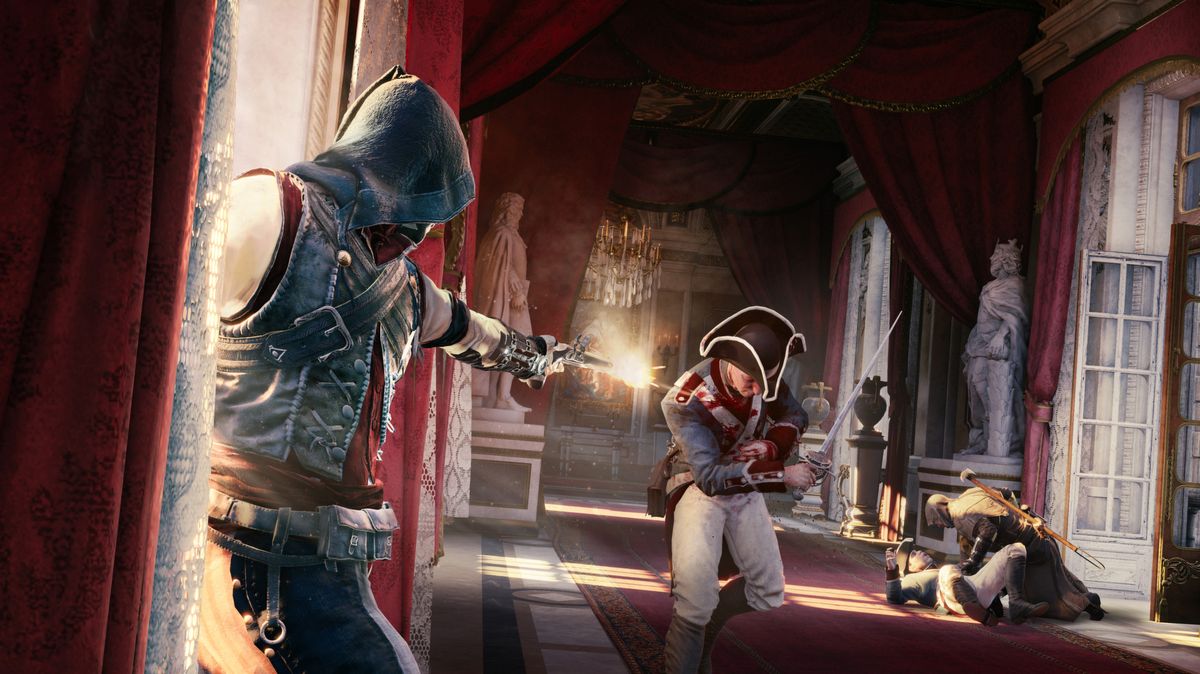
Ubisoft must have inadvertently tempted the gods of irony when it named its eighth instalment Assassin's Creed Unity, since it is forever doomed to be remembered as the entry that didn’t quite come together. The developer designed the game to take full advantage of the new PS4 and Xbox One, and got its wish, but not in the way it wanted. During the month of Assassin's Creed Unity’s launch, players used the consoles' social sharing tools to flood Twitter with unflattering images of protagonist Arno. There was the master assassin, hanging from a ledge that wasn’t there, stuck fast in a bale of hay, and so well disguised that his whole face was invisible, leaving his only eyeballs and lips suspended creepily below a hovering hairpiece. Within weeks, Ubisoft Canada CEO Yannis Mallat had written an apology for a "diminished" game, and promised every player free DLC.
It was the final controversy in a release campaign that had, like Assassin’s Creed's weather programmers, achieved a perfect storm. The cover of Unity featured four lightly-bearded blokes of identical build and complexion – an unfortunate side effect of Ubisoft's plan to let everyone play as Arno in co-op, ensuring continuity with the solo campaign. For many, the image summed up the company's problem with diversity. Years later, sources speaking to Bloomberg claimed that Ubisoft's marketing department and chief creative officer, Serge Hascoët, had actively resisted any pushes towards female protagonists in Assassin's Creed. Hascoët and Mallat ultimately resigned after reports of sexual misconduct at Ubisoft studios.
What’s more, Unity bore the hallmarks of Ubisoft's apolitical phase – a mandate from on high that its games should present many perspectives and endorse none. As such, Unity plotted a path through the French Revolution without ever picking a side – a feat of story gymnastics, perhaps, but one that riled up left-wing French politician Jean-Luc Mélenchon, who called the result "propaganda". It was a trifecta of reputational damage that buried Unity. But delve into the catacombs, and you'll find a stealth game that, while obtuse, delivers on the initial sell of Assassin's Creed like no other entry in the series.
Crowd psychology
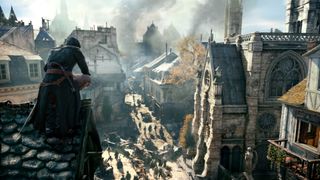
Before Unity, Assassin's Creed had already begun to drift away from the urban camouflage that was once its defining feature. 2013's Black Flag and 2014's Rogue were less dedicated to social stealth than to trade and tribulation on the open sea. But Unity was directed by Alexandre Amancio, who had led Revelations – at that point, the last city-based Assassin's Creed.
Unity picks up where Revelations left off, only with the power of better consoles and the grandeur of Paris. The crowds that had been the focal point of Assassin's Creed's first-ever E3 demo are now rivers of people, a living current for Arno to navigate. Unlike long grass, the stealth game's most tired fallback, the masses have a mood that must be respected. Fire a gun and they'll stampede away, taking your cover with them.
Landmark buildings, newly blessed with full interiors, are no longer just cake decorations to be clambered over. Notre Dame Cathedral becomes a level out of Hitman or Dishonored, pushing players to discover multiple routes in and out, in some cases by solving side objectives. On top of that, Ubisoft Montreal layers a disguise system, as well as cover-clinging stealth in the style of Splinter Cell, and an array of projectiles that alter NPC behaviour.

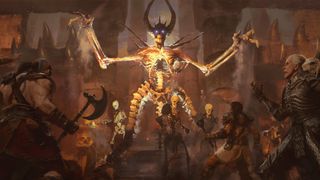
It's a toolset that can easily get away from you. Arno has so many options in a given moment that it’s difficult to convey, via a controller with 18 inputs, exactly what you want the game to do. We live in the age of the contextual action game – in which buttons perform different functions depending on what you’re near or looking at – and Unity is perhaps the most extreme example.
Sign up to the 12DOVE Newsletter
Weekly digests, tales from the communities you love, and more
It's constantly interpreting, making its best guess as to whether you want to stab the guard on the roof in front of you, or air assassinate the one patrolling the courtyard three floors down. Sometimes the game gets it wrong. It's telling that Watch Dogs, also developed by Ubisoft Montreal, introduced a cursor – a line that extended from your phone to distinguish exactly what you were hoping to influence with your next button press.
Infiltrating a vertiginous Parisian palace already demands a superhuman, three-dimensional awareness of your environment. Remembering, simultaneously, that it's L2 to swing through an open window, and then L2 again to enter stealth mode, is a big ask. Understandably, critics dismissed Unity as fiddly, and the series later stepped back from this level of density.
The counterpoint is to be found on YouTube, where top players like Zevik demonstrate how to clear missions meant for four players, on their own, without once breaking into open conflict. The best assassins are a pleasure to watch: purposeful and precise in their movements, almost never breaking into a run. They switch with ease between multiple tools, chaining together disguises, smoke bombs and crowdwork to get from one end of a street to the other without being seen. And since Unity took away the cheap fallbacks, like whistling to get a guard's attention, it's highly skilled play. It's for this reason that Unity is beloved among series diehards: it's the master assassin game that gives you the most to master.
Distant memory

"Unity delivers on the initial sell of Assassin's Creed like no other entry in the series."
The problem is that most will never see the game this way. Unity's major concession to the mainstream is that it rarely punishes you for being spotted, letting you bludgeon your way through the campaign. As such, there's little pressure to chase the platonic ideal of social stealth found on YouTube.
Everyone knows what happened next: the wayward Black Flag model for Assassin's Creed won out, and the games moved further into the territory of the action-RPG. Today, stealth is an optional extra, rather than the central premise. Maybe that's as it should be. Unity offers a particular and exacting extreme – hardly the stuff of a AAA game shooting for the largest possible audience.
But now, with the series fatigue of 2014 an ancestral memory and the worst of the bugs banished, Unity can be appreciated as the most Assassin’s Creed game there is – the one with the tallest buildings, the deepest stealth, and the toughest challenge.
Look ahead to the most anticipated games on the way this year in our in-depth Big in 2021 preview, or watch below for tips to get by in Assassin's Creed Valhalla.
Jeremy is a freelance editor and writer with a decade’s experience across publications like GamesRadar, Rock Paper Shotgun, PC Gamer and Edge. He specialises in features and interviews, and gets a special kick out of meeting the word count exactly. He missed the golden age of magazines, so is making up for lost time while maintaining a healthy modern guilt over the paper waste. Jeremy was once told off by the director of Dishonored 2 for not having played Dishonored 2, an error he has since corrected.
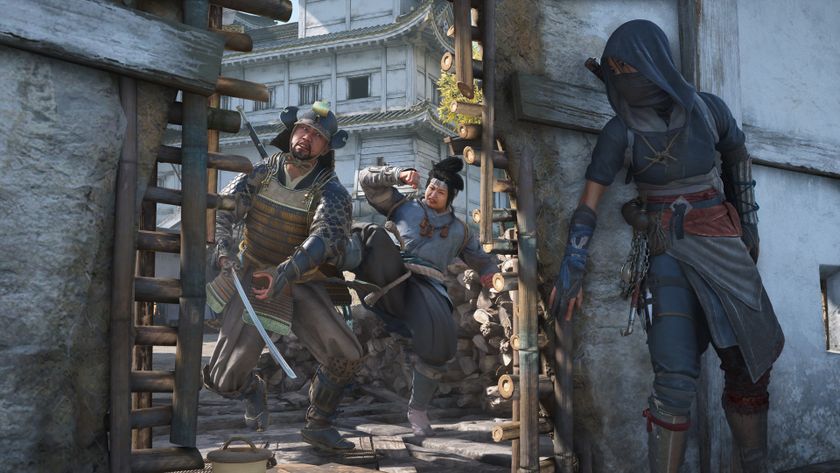
Assassin's Creed Shadows devs "actively looking at" an even harder difficulty mode for the RPG: "How challenging do you want it?"
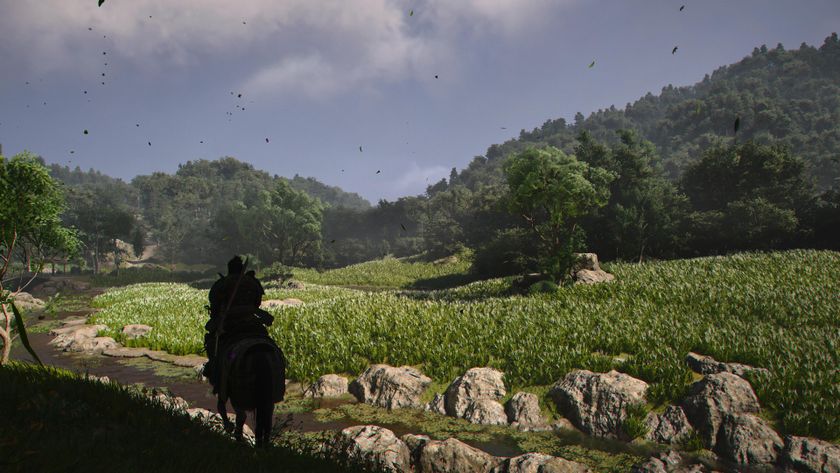
Assassin's Creed Shadows' delays were mostly used to polish the RPG, creative director confirms, not for deeper changes brought about by Star Wars Outlaws reaction

